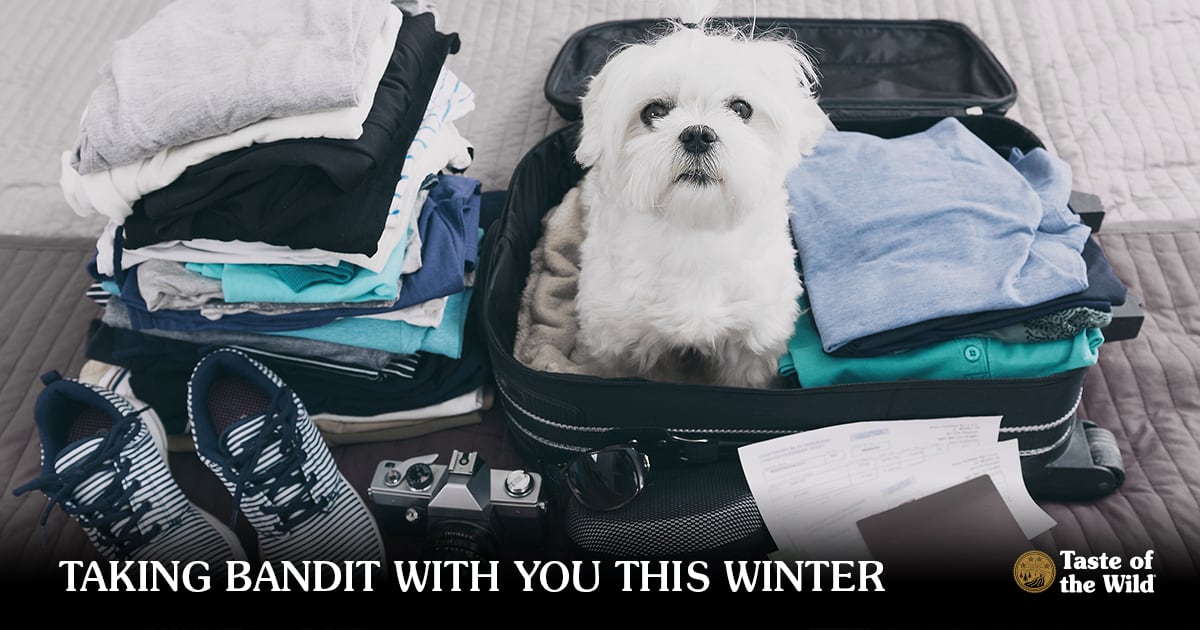
Let’s face it: there’s only so much shoveling you can do before your arms go on strike and demand a winter vacation. Whether you want to surf the waves at the beach or rip through the moguls at a ski resort, your dog or cat shouldn’t always have to stay behind. Why not consider a winter vacation with your pet?
To help with your pet travel plans, we’ve created a simple checklist of pet-centric things to consider before you hit the road.
GET OUTTA TOWN
Have a destination in mind? It’s easy to find pet-friendly hotels in just about any location. Some even offer concierge pet services, including walks and “pawdicures” for when pet parents are out and about, as well as a special room-service menu just for the canine or feline palate. Check to see if there are size or weight restrictions and refundable damage deposits. It also doesn’t hurt to make sure the room is pet-proofed before you give your dog or cat free range over the king-size bed and couch.
SCHEDULE A VETERINARY APPOINTMENT
If you’re traveling by plane, you’ll need a health certificate for your pet completed by your veterinarian within 10 days of your domestic flight (for international travel, you should start planning six months in advance). Your veterinarian will need to examine your pet and certify that he or she is not only healthy but also current on his or her vaccines.
It’s also important to tell your veterinarian where you’ll be taking your pet. He or she can determine if there are any health risks in that part of the country and provide vaccinations or other medications if needed. Plus, when you’re abandoning the snowdrifts for the beaches, it can be easy to forget flea preventives and other pet health care items, such as prescription medications, where you’re going. Your veterinarian will no doubt remind you.
TALK TO THE AIRLINE
Before you go, find out whether your pet can travel in the cabin or in cargo. Ask about kennel requirements. Be aware there may be weather restrictions; many airlines won’t accept pets in cargo during warm or cold temperature extremes, for the safety of your pet.
Certain brachycephalic, or flat-faced dogs (like pugs or shih tzus) or cats may not be able to fly in cargo. In general, it’s not recommended to sedate or tranquilize your pet for the flight, as these medications can be unpredictable at high altitudes.
CHECK IDENTIFICATION TAGS
If your pet accidentally slips out the door when you’re out of town, it may feel disoriented by the new location and not know how to make it back to you. That’s why, before you leave, you should make sure your pet has a current ID tag on its collar, including your cell phone number, and do the same thing on its pet carrier. If your winter vacation will stretch over a month or longer, consider getting temporary ID tags bearing your vacation address and phone number.
You should also call the microchip company to make sure they have your most current contact information.
PACK THE COMFORTS OF HOME
Part of a great vacation is seeing new sights, but that can be overwhelming for some pets. Make sure to bring the familiar comforts of home, such as your pet’s own bedding, food and water bowls, toys and litter box. (And, of course, don’t forget the fecal waste bags.)
You’ll also want to keep your pet’s diet as consistent as possible. No one wants to deal with vomiting and diarrhea when you’re on the road, least of all your pet. So make sure to pack your dog or cat’s regular diet and treats with you.
CONSIDER A PET STAYCATION
Lastly, if your pet is shy or uneasy in new situations, traveling may be too stressful on him or her. In those cases, it may be best to set your pet up at a local boarding kennel or leave your pet at home with a pet sitter you trust. There are new gadgets that let you talk remotely with your pet and dispense treats, even when you’re away. That way, your pet is sure to welcome you with a happy dance on your return.
RELATED POST: Vacation With Your Best Friend
The information in this blog has been developed with our veterinarian and is designed to help educate pet parents. If you have questions or concerns about your pet's health or nutrition, please talk with your veterinarian.
